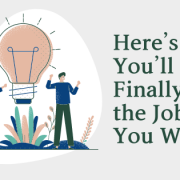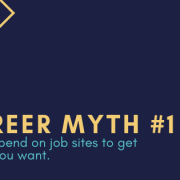Three Things to Do Before You Look for a New Job in 2015
Networking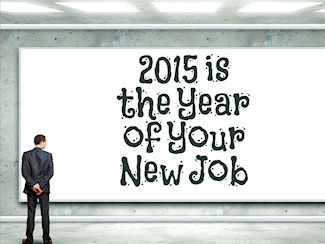 Every year around the holidays, I read articles about why looking for a job during this time can work to your advantage and why you shouldn’t assume no one is hiring during the holidays. I’m a fan of ramping up your search during the holidays, or at the very least, maintaining your momentum and taking advantage of casual gatherings to network and make connections.
Every year around the holidays, I read articles about why looking for a job during this time can work to your advantage and why you shouldn’t assume no one is hiring during the holidays. I’m a fan of ramping up your search during the holidays, or at the very least, maintaining your momentum and taking advantage of casual gatherings to network and make connections.
Personal note from me to all job seekers out there: Use the holidays. Seriously. Consider doing this:
- Ask people to coffee – they love to get out of the office this time of year.
- Reach out to a contact you haven’t connected with in a while with a personal note.
- Use all of the events around town to get out and about. You don’t have to be at a professional networking event to make a great contact.
So let’s talk about what you can be doing between now and the beginning of the year if you’ve decided that 2015 is the Year of Your New Job.
I’ve been thinking long and hard about this – and even doing some research on how to successfully create positive outcomes (so far, the resource I’ve found most interesting/helpful is Before Happiness: The 5 Hidden Keys to Achieving Success, Spreading Happiness and Sustaining Positive Change, by Shawn Achor) . I’ve also been observing and analyzing my clients’ patterns A LOT this year and I’ve observed a couple of interesting trends.
Here are the three common elements I’m noticing who have had successful job searches this year:
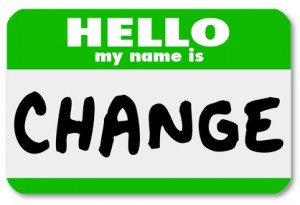 ONE: They make a change in another area of their life first.
ONE: They make a change in another area of their life first.
Usually, one that makes them a bit nervous or tosses them outside of their comfort zone. No kidding. For example, they leave a toxic relationship. They change their diet and lose some weight. They immerse themselves in a new hobby. They downsize. They start dating. They move.
These activities tend to shake up old patterns, which in turn, create movement. But change also helps to flex and develop your resiliency muscle. And an intact resiliency muscle is what you’ll need to weather the frequent ups and downs of a contemporary job search.
I trust you know what change is pushing up against your comfort zone at this very moment. Go do it.
TWO: They explore and connect to help them get clear about their direction.
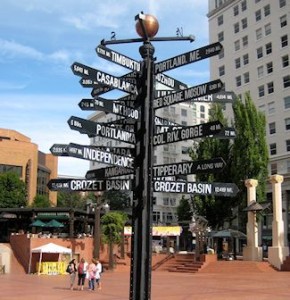 They do this rather than waiting until they’re clear to explore and connect. Got that? Counter-intuitive, I know. Smart, got-it-together professionals do their research and organize their game plan BEFORE they start connecting with their network, right? Nope.
They do this rather than waiting until they’re clear to explore and connect. Got that? Counter-intuitive, I know. Smart, got-it-together professionals do their research and organize their game plan BEFORE they start connecting with their network, right? Nope.
Smart professionals know that trying to figure out their job search game plan, without outside input, is the equivalent of trying to put together a business plan without a business.
“But I don’t want to waste my network’s time if I don’t have it figured out.” Wasting their time asking for input is totally different than wasting their time because you’re all over the board. Don’t try and be all things to all people and you won’t waste anyone’s time.
Assess your strengths and then ask others for their input. Good networking isn’t about having one-shot to make the basket.
You’ve got at least one person in your network that could help you clarify your direction. I know you do. Reach out to them.
THREE: They adopt a positive mindset.
 Even when they’re uncertain about change or where they’re headed, they maintain a positive mindset. They resist feeling panicked. They resist getting overwhelmed or paralyzed as their search progresses. When things don’t go as planned, they don’t freak out or give up.
Even when they’re uncertain about change or where they’re headed, they maintain a positive mindset. They resist feeling panicked. They resist getting overwhelmed or paralyzed as their search progresses. When things don’t go as planned, they don’t freak out or give up.
When faced with rejection, they move through it with graceful self-awareness. They also do a great job at filtering all of the negative job market information trying to tell them that having a dream job goal is unrealistic or that they’ll have to take a pay cut in order to do something new.
Keeping a positive mindset is no small feat. It’s not enough to recite positive affirmations. It takes grit, the willingness to be uncomfortable, and the belief that it will all work out.
The biggest difference I see with clients who have a positive mindset is their ability to counter every negative with at least two positives. For example, Jamie recently interviewed for her dream job, because of a networking contact she had cultivated. She had worked so hard to get the opportunity to interview, and I wasn’t sure how she was going to feel knowing that the job had been offered to someone else.
She shared that while she was disappointed about not getting the job, she had really connected with the individuals she interviewed with. Furthermore, and she was very pleased about this because this means she was fully engaged in the process, despite being horribly (her word) nervous.
The biggest difference I see with clients who have a positive mindset is their ability to counter every negative with at least two positives.
She also reached out to the networking contact that had helped to facilitate the interview, and the two of them are establishing a friendship, not just a business relationship. Even though none of these things, on the surface, are moving her career forward, she is choosing to focus on the positive elements. Positive energy is contagious. And fun to be around.
Whatever it takes, a positive mindset will attract positive outcomes. What can you do to develop and maintain a positive outlook?
Here’s to getting a jumpstart on a brilliant Year of Your New Job.

I’m Stacey Lane: Confidence Builder. Networking Smarts. Resume Wordsmith. Personal Branding Strategist. Career Coach.
I help individuals with unique backgrounds find their perfect fit and effectively market themselves so they find work that is as interesting as they are.
Contact me to get started!
 If your cover letter is the one things standing between you and an awesome job opportunity, check out my latest webinar on December 18.
If your cover letter is the one things standing between you and an awesome job opportunity, check out my latest webinar on December 18.
Yes! You still need to send a cover letter along with your resume. But cover letter styles have dramatically changed and they no longer serve the purpose of formally introducing you to a potential employer.
Cover letters are now a powerful marketing tool that can give you a competitive advantage if you use them strategically. They’re an excellent way to connect-the-dots, in a way that your resume just can’t, between your experience and the potential employer’s needs.
Learn more and sign-up for this FREE webinar here.

